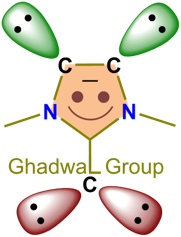Molecular Inorganic Chemistry and Catalysis
advancing low-valent main-group chemistry for sustainable synthesis, catalysis, and materials
Scientific Talks
- GDCh-Vortragstagung für Anorganische Chemie 2024
Technische Universität München
Heavier Main-Group Aromates and Diradical(oid)s beyond Carbene - GDCh-Chemiedozententagung 13.03.2024
RWTH Aachen
Aktivierung kleiner Moleküle und Katalyse mittels Niedervalente Hauptgruppenspezies - Anorganisch-chemisches Kolloquium 24.05.2023
Department für Chemie, Universität zu Köln
Stabile Radikale und metallorganische Katalyse auf Basis unkonventioneller Kohlenstoff-Donor-Liganden - Anorganisch-chemisches Kolloquium 17.05.2023
Institut für Chemie, Technische Universität Berlin
Stabile Radikale und metallorganische Katalyse auf Basis unkonventioneller Kohlenstoff-Donor-Liganden - Spring Meeting GDCh Working Group Phosphorus Chemistry 13.03.2023
TU Dresden
Phosphorus (& heavier pnictogens) with Unconventional Carbenes for Functional π-Conjugated Molecular Systems - Chemistry Seminar 09.09.2022
Department of Chemistry, Dalhousie University, Halifax, Canada
Transition Metal Catalysis for Stable Radicals, Diradicals, and π-Conjugated Molecules: Challenges and Perspectives - Inorganic Chemistry Seminar 11.08.2022
Department of Chemistry and Biochemistry, Baylor University, Waco (Texas), USA
Stable Radicals and Diradicals Based on Unconventional Carbon-Donor Frameworks - Inorganic Chemistry Seminar 10.08.2022
Department of Inorganic Chemistry, Texas A&M University, College Station (Texas), USA
Merging Unconventional Singlet Carbenes with Heavy Main-Group Elements: Accessing Functional Molecules with Unique Potentials - Inorganic Chemistry Seminar 21.07.2022
Department of Inorganic Chemistry, Massachusetts Institute of Technology (MIT), Cambridge, USA
Stable Radicals and Diradicals Based on Unconventional Carbon-Donor Frameworks - Anorganisch-chemisches Kolloquium 21.06.2022
Heinrich-Heine-Universität Düsseldorf
Stable Main-Group Radicals and Diradicals Based on Unconventional Carbon-Donor Ligands/ Frameworks - GDCh-Chemiedozententagung 23.03.2022
Universität des Saarlandes, Saarbrücken
Isolation and Exploration of Heavy Main-Group Diradicaloids - Global Inorganic Discussion Weekdays (GIDW) 13.12.2021
Chemical Institute of Canada
Open-shell Main-Group Chemistry Beyond Carbon Analogy - International Conference on Main-group Molecules to Materials-II (MMM-II) 13-15.12.2021
School of Chemical Sciences, NISER, Bhubaneswar, India
Stable Main-Group Radicals and Diradicals Based on Carbon-Donor Ligands - GDCh-Chemiedozententagung 16.03.2021
Universität Rostock (Web-Konferenz)
Heavier Main-Group Benzene Derivatives- Beyond Carbon Analogy - The Phosphorus Chemistry Webinar 21.05.2020
(Supported by the GDCh and AG Phosphorchemie)
Advancing Open-Shell Phosphorus Chemistry aided by π-Conjugation - Institut für Allgemeine, Anorganische und Theoretische Chemie 08.01.2020
Fakultät für Chemie und Pharmazie, Leopold-Franzens-Universität Innsbruck, Innsbruck, Österreich
Unconventional Carbenes for Organometallic Catalysis and Main-Group Chemistry - GDCh-Chemiedozententagung 20.03.2019
Universität Koblenz-Lindau, Koblenz
σ- and π-Donor Stabilization of Low-valent Pnictogen Compounds - Chemistry Seminar 19.02.2019
Wielkopolskie Center for Advanced Technology, Adam Mickiewicz University, Poznań, Poland
Stable Radicals and Radicaloids: Open-shell Molecules for Innovative Materials - Vortragstagung für Anorganische Chemie der Fachgruppen Wöhler-Vereinigung und Festkörper- chemie und Materialforschung 24-27.09.2018
Universität Regensburg, Regensburg
Rings and Chains with a Low-valent Phosphorus Atom: Beyond Carbon Copy - Inorganic Chemistry Seminar 29.05.2018
École polytechnique fédérale de Lausanne (EPFL), Institut des sciences et ingénierie chimiques, LCS, BCH 3307, CH-1015 Lausanne, Switzerland
Main-group Radicals and Radicaloids Supported by Carbon-Donor Ligands - Skilizium Tagung 19.03.2018
Les Crosets, Portes du Soleil, Switzerland
Carbon-centered Radicals and Radicaloids - GDCh-Chemiedozententagung 06.03.2018
Friedrich-Schiller-Universität Jena, Jena
Main Group Radicals and Radicaloids (Build on New Carbon-Donor Ligands) - AGICHEM (Anglo-German Inorganic Chemistry Meeting) 07.08.2017
Georg-August-Universität Göttingen, Göttingen
Carbon-Donor Ligands Beyond Classical NHCs in Service of Main Group Chemistry and Organometallic Catalysis - Vortrag im Rahmen der Umhabilitation 21.04.2017
Fakultät für Chemie, Universität Bielefeld, Bielefeld
Unkonventionelle Kohlenstoff-Donor-Liganden für niedervalente Hauptgruppenchemie und Katalyse - GDCh-Chemiedozententagung 12.03.2017
Fachbereich Chemie der Philipps-Universität Marburg, Marburg
Anormale-NHC (aNHC) und ditopisch-carbanionische-aNHC (dc-aNHC) Komplexe: Synthese, Struktur und katalytische Anwendungen - Anorganisch-chemisches Kolloquium 10.11.2016
Institut für Anorganische Chemie, Rheinische Friedrich-Wilhelms-Universität Bonn, Bonn
Unconventional Carbon Donor Ligands in Service of Main Group Chemistry and Catalysis - Vortrag im Rahmen der Habilitation 06.04.2016
Institut für Anorganische Chemie, Fakultät für Chemie, Georg-August-Universität Göttingen, Göttingen
Non-Innocent Ligands - Habilitationskolloquim
Institut für Anorganische Chemie, Fakultät für Chemie, Georg-August-Universität Göttingen, Göttingen
Frustrated Lewis Pairs (FLPs): Catalysis and other Applications - GDCh-Wissenschaftsforum Chemie 30.08-02.09.2015
Technische Universität Dresden und Max-Planck-Institut für Chemische Physik fester Stoffe, Dresden
Mono- and Di-Cationic Hydrido Boron Compounds - GDCh-Chemiedozententagung 04.03.2015
Fakultät für Chemie und Pharmazie, Universität Regensburg, Regensburg
Rational Access to Mesoionic Carbene Metal Complexes: A Catalytic Approach - Anorganisch-chemisches Kolloquium 02.12.2014
Technische Universität München (TUM), Fakultät für Chemie, Munich Dichlorosilylene: A High Temperature Transient Species to a Key Building-Block - Chemistry Seminar 14.03.2014
Centre national de la recherche scientifique, (CNRS), Paris, Frankreich
Energy Relevant Small Molecule Activation and Catalysis: A Rational Approach - GDCh-Chemiedozententagung 11.03.2014
Department Chemie, Universität Paderborn, Paderborn
Borylene Insertion into C–N and C–H Bonds - Anorganisch-chemisches Kolloquium 19.02.2014
Institut für Anorganische Chemie, Karlsruher Institut für Technologie (KIT), Karlsruhe
Smart Systems for Small Molecule Activation and Catalysis - Chemistry Seminar 16.12.2013
UMR 7177 CNRS/ Université de Strasbourg, Laboratory of Organometallic Chemistry and Systemics (LCOMS), Institut de Chimie de Strasbourg, Strasbourg, Frankreich
Energy Relevant Small Molecule Activation and Catalysis - Anorganisch-chemisches Kolloquium 03.12.2013
Anorganische Chemie und Strukturchemie, Fakultät für Chemie, Universität Bielefeld, Bielefeld
Beyond NHCs: Emerging Smart Systems for Small Molecule Activation and Catalysis - GDCh Göttinger JC-Forum 05.06.2013
Fakultät für Chemie, Georg-August-Universität Göttingen, Göttingen
Abnormal N-Heterocyclic Carbenes and Borylenes: More than a Synthetic Approach - GDCh-Weihnachtskolloquium 13.12.2012
Fakultät für Chemie, Georg-August-Universität Göttingen, Göttingen
Kleine, aber ungewöhnliche Moleküle - Chemistry Seminar 01.07.2010
CAT Catalytic Center, ITMC. RWTH Aachen, Aachen
Compounds with a Low Valent Silicon Atom and their Synthetic Potential - Anorganisch- und Analytisch-chemisches Kolloquium 25.10.2010
Fachbereich Chemie der Philipps-Universität Marburg, Marburg
Dichlorosilylene and its Synthetic Potential to Access Unusual Molecules

© 2024 Ghadwal Research Group
Anorganische Chemie und Strukturchemie (ACS), Fakultät für Chemie
Universität Bielefeld, E4-124, Universiätsstr. 25, D-33615 Bielefeld
Tel: 0049-521-106-6167 (Off.); Fax:0049-521-106-6026
E-mail: rghadwal@uni-bielefeld.de
